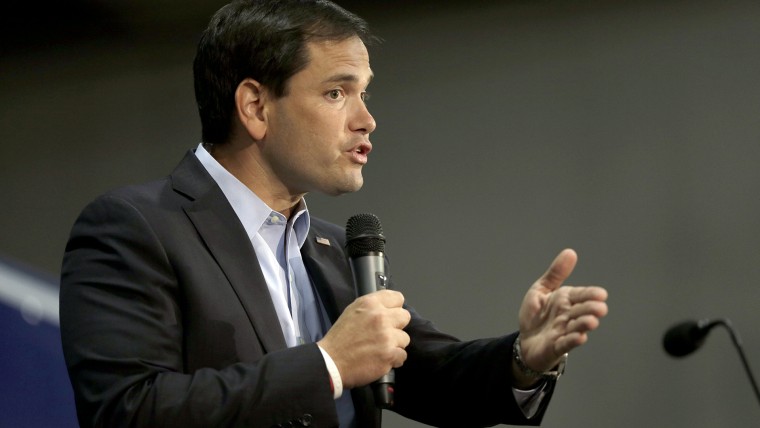The politics of President Obama's new U.S. policy towards Cuba does not fall neatly along partisan lines. Plenty of Republicans and the U.S. Chamber of Commerce are celebrating the White House's announcement, while a handful of Democrats, most notably Sen. Bob Menendez (D-N.J.), aren't at all pleased.
But among all critics, few have been as vocal and visible today as Sen. Marco Rubio (R-Fla.), who's been apoplectic about the administration's breakthrough. That's not unexpected, though the far-right senator's complaints seem deeply flawed and poorly thought out.
"While business interests seeking to line their pockets, aided by the editorial page of The New York Times, have begun a significant campaign to paper over the facts about the regime in Havana, the reality is clear."
It almost sounds as if Rubio thinks "business interests" -- in this case, farmers and Rubio's allies at the U.S. Chamber of Commerce -- should accept limits on free enterprise, even as other countries trade with an American neighbor. Doesn't the senator usually see "business interests" as "job creators"?
"But most importantly, the regime's brutal treatment of the Cuban people has continued unabated. Dissidents are harassed, imprisoned and even killed. Access to information is restricted and controlled by the regime."
Right, and that's after 54 years of the exact same U.S. policy. How many more decades of a failed policy would Rubio recommend to improve the conditions of the Cuban people? Isn't it at least possible that Cubans will benefit from better relations and expanded opportunities with the United States?
Rubio later said Obama's moves "will tighten" the Castro regime's grip on power "
for decades." I suppose that's possible, but my follow-up question for the senator is simple:
hasn't the Castro regime already had a tight grip on power for decades? Has the old, ineffective U.S. policy weakened that grip in any way whatsoever?
Rubio then
raised concerns that normalized relations won't address Cuba's human rights record, which is an odd argument coming from a senator who was defending torture just last week.
The senator saved some of his most striking material
for Fox News.
"At minimum, Barack Obama is the worst negotiator that we've had as president since at least Jimmy Carter, and maybe in the modern history of the country."
Didn't Jimmy Carter negotiate the Camp David Accords, one of the most sensitive and successful diplomatic endeavors of this generation? Couldn't Rubio think of a less ridiculous comparison?
As if all of this wasn't quite enough, the Floridian decided it'd also be a good idea to
lecture the Pope.
Florida Sen. Marco Rubio (R) torched President Barack Obama's new policy aimed at normalizing U.S. diplomatic relations with Cuba on Wednesday, and addressed Pope Francis' support for the president's move. "My understanding is that the influence that His Holiness had was on the release of Mr. [Alan] Gross, which I've not criticized. As I said, I'm happy that he's with the Cuban people [sic]. I would also ask His Holiness to take up the cause of freedom and democracy, which is critical for a free people — for a people to truly be free," Rubio, a Catholic whose parents immigrated from Cuba to flee the Castro regime, told reporters.
Look, I realize that foreign policy obviously isn't Marco Rubio's strong suit. In September, when he called for a "permanent" U.S. troop presence in the Middle East, his entire argument
seemed quite foolish. A month later, Rubio urged President Obama's to follow a specific course against Islamic State militants, and then he
complained bitterly when Obama did exactly what the senator suggested.
If Rubio is going to make this the centerpiece of a national campaign, he's going to need a more persuasive pitch.
